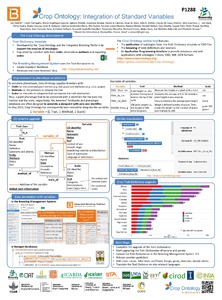Location
US Postal address:
C.I.P./Mexico/ AP # 370
P.O. Box 60326
Houston TX 77205 U.S
CIMMYT works throughout the developing world to improve livelihoods and foster more productive, sustainable maize and wheat farming. Our portfolio squarely targets critical challenges, including food insecurity and malnutrition, climate change and environmental degradation.
Through collaborative research, partnerships, and training, the center helps to build and strengthen a new generation of national agricultural research and extension services in maize- and wheat-growing nations. As a member of the CGIAR System composed of 15 agricultural research centers, CIMMYT leads the CGIAR Research Programs on Maize and Wheat, which align and add value to the efforts of more than 500 partners.
Turning research into impact
- By conservative estimates, this work provides at least $2 billion in annual benefits to farmers.
- CIMMYT alumni include a Nobel Peace Prize laureate and three World Food Prize winners.
- CIMMYT’s success depends on the longstanding partnerships and trust of public agricultural research systems, private companies, advanced research institutes and academia, and non-governmental and farmer organizations.
- More than 70 percent of the wheat grown in developing countries and more than 50 percent of improved maize varieties derive from CIMMYT breeding materials.
- More than 10,000 scientists have trained at CIMMYT and gone on to become leaders in their own countries. The center empowers thousands of students, extension workers and farmers through courses, workshops and field days.
Members:
Resources
Displaying 1 - 5 of 38Effects of in-situ rainwater harvesting techniques on run-off, soil loss, soil moisture status and maize performance in semi-arid of central Tanzania
Pathways from research on improved staple crop germplasm to poverty reduction for smallholder farmers
Innovations to improve staple crop germplasm can reduce poverty and otherwise improve farmer livelihoods through complex and multiple pathways. This paper reviews the evidence for one prominent pathway—through increased incomes (in cash and kind) for poor farmers who adopt the technology.
A methodological approach for assessing cross-site landscape change: Understanding socio-ecological systems
Crop ontology: integration of standard variables
The Crop Ontology (CO, http://www.cropontology.org/) is a resource of the Integrated Breeding Platform (IBP, http://integratedbreeding.net/) providing breeders with crop specific terms for fieldbook edition and data annotation. Until Mai 2015, a plant phenotype was annotated with 3 CO identifiers for the trait, the method and the scale, respectively. Yet, breeders’ fieldbook and most phenotypic databases are designed to annotate a datapoint with only one identifier.




